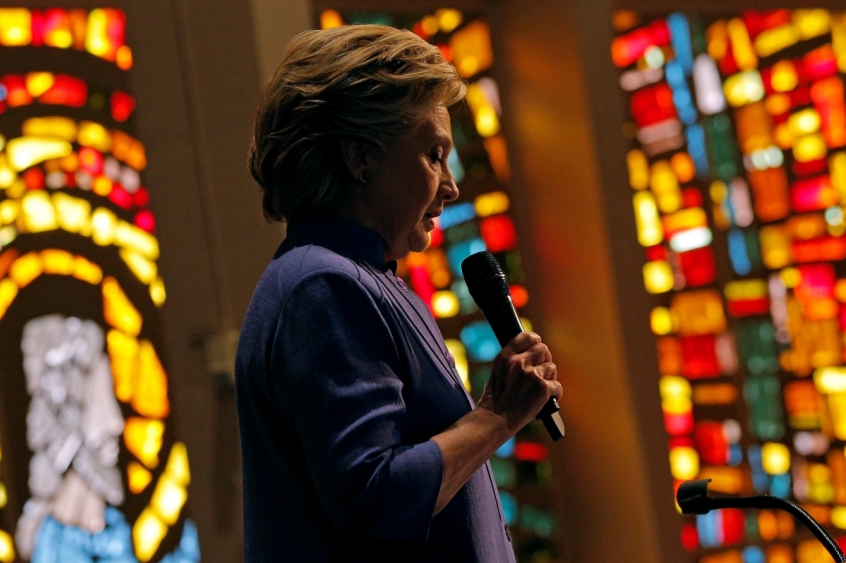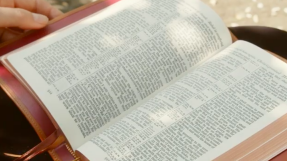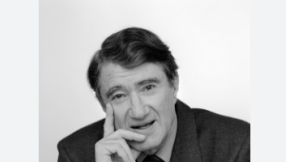
Hillary Clinton wants to preach.
That was the simple introduction to a revelatory news feature in The Atlantic this week, which claimed that the Democrat former presidential candidate said this to Bill Shillady, her long-time pastor, at a recent photo shoot for his new book about the daily devotionals he sent her during the 2016 campaign.
'Given her depth of knowledge of the Bible and her experience of caring for people and loving people, she'd make a great pastor,' Shillady told The Atlantic. No, she probably won't go to seminary; she probably won't pursue an official lay position in the Methodist church, like deaconess. 'I think it would be more of ... her guest preaching at some point,' he said. 'We have a long history of lay preachers in the United Methodist Church.'
Since the election, he added, 'I think her faith is stronger...I haven't noticed anything different, except that I think she is more relaxed than I've ever seen her.'
The report cited other 'scattered' bits of information that have come out, backing the idea of Clinton focusing on faith: last autumn, for example, the former Newsweek editor Kenneth Woodward revealed that Clinton told him in 1994 that she thought 'all the time' about becoming an ordained Methodist minister. However, in a comment which typifies Clinton's apparent ambivalence towards public knowledge of her faith, she told him not to write about it because 'It will make me seem much too pious'.
Clinton is not alone. Tony Blair once said, after stepping down as prime minister, that religion was 'how I want to spend the rest of my life' before launching the Tony Blair Faith Foundation. 'Religious faith will be of the same significance to the 21st century as political ideology was to the 20th century,' Blair added.
Now, two books are set for publication this autumn: What Happened, Clinton's personal account of the election, and Strong for a Moment Like This, Shillady's book of devotionals.
Shillady, who runs the United Methodist City Society in New York, wrote the book at Clinton's suggestion, according to The Atlantic, and his is the only book for which Clinton has agreed to write a foreword. Clinton and her aides read and approved the copy ahead of time.
Strong for a Moment Like This brings together daily devotionals written after Shillady got up at 4am, for Clinton to use in the day ahead, from 2015 onwards, when she first announced that she would be running for the presidency.
Other pastors contributed, including more than 100 women clergy who formed a group called 'We Pray with Her'.
According to the Atlantic, the book 'offers a rare window into the way Scripture appears to have shaped Clinton on the campaign trail – as it has throughout her life'.
Hillary Rodham grew up attending First United Methodist Church in the conservative suburb of Park Ridge, Illinois.
During the Bill Clinton administration which at times caused upset to Hillary, the family attended Foundry United Methodist Church in Washington, D.C.
Strong for a Moment Like This suggests that Clinton was thinking about biblical themes throughout 2015 and 2016.
Yet she has at times been all too guarded. Early in her career, she learned the dangers of speaking publicly about her religious beliefs. As The Atlantic recalls, 'When she was First Lady, progressives roundly mocked her moralism, and conservatives doubted her sincerity. After getting widely panned for a speech about America's "crisis of meaning" in 1993, Clinton waited nearly a year to talk about spirituality again – and did so, she said, "with some trepidation".'
As long-time friend of Clinton Lissa Muscatine told the New York Times: 'It's been a remarkably private part of this hugely public person's existence. It's almost like, because it's so private and has motivated her so deeply, that she doesn't talk about it.'
It was on January 25, at a town-hall-style gathering inside a gymnasium in Knoxville, Iowa when, after years of not talking about it publicly, Clinton came out as a passionate Christian.
Asked by a Democrat-leaning voter about her beliefs, she opened up. It is worth quoting her at some length because all-too-unusually, it was clear that the guarded presidential candidate finally spoke from the heart:
'I am a person of faith. I am a Christian. I am a Methodist. I have been raised Methodist. I feel very grateful for the instructions and support I received starting in my family but through my church, and I think that any of us who are Christian have a constantly, constant, conversation in our own heads about what we are called to do and how we are asked to do it, and I think it is absolutely appropriate for people to have very strong convictions and also, though, to discuss those with other people of faith...My study of the Bible, my many conversations with people of faith, has led me to believe the most important commandment is to love the Lord with all your might and to love your neighbour as yourself, and that is what I think we are commanded by Christ to do, and there is so much more in the Bible about taking care of the poor, visiting the prisoners, taking in the stranger, creating opportunities for others to be lifted up, to find faith themselves that I think there are many different ways of exercising your faith.
'But I do believe that in many areas judgment should be left to God, that being more open, tolerant and respectful is part of what makes me humble about my faith, and I am in awe of people who truly turn the other cheek all the time, who can go that extra mile that we are called to go, who keep finding ways to forgive and move on. Those are really hard things for human beings to do, and there is a lot, certainly in the New Testament, that calls us to do that.'
Clinton went on to discuss the Sermon on the Mount, clearly a central Bible passage for her. 'There's a lot of great Bible studies: What does the Sermon on the Mount really mean? What is it calling us to do and to understand? Because it sure does seem to favour the poor and the merciful and those who in worldly terms don't have a lot but who have the spirit that God recognizes as being at the core of love and salvation.'
And she explained how she differs from some conservative Christians. 'So there is much to be learned and I have been very disappointed and sorry that Christianity, which has such great love at its core, is sometimes used to condemn so quickly and judge so harshly.'
With right-wing, white evangelicals on the rise in America, and apparently tightening their grip on the White House, Hillary Clinton 'coming out' fully as a Christian and providing this type of antithetical form of preaching may be just what the country needs.













